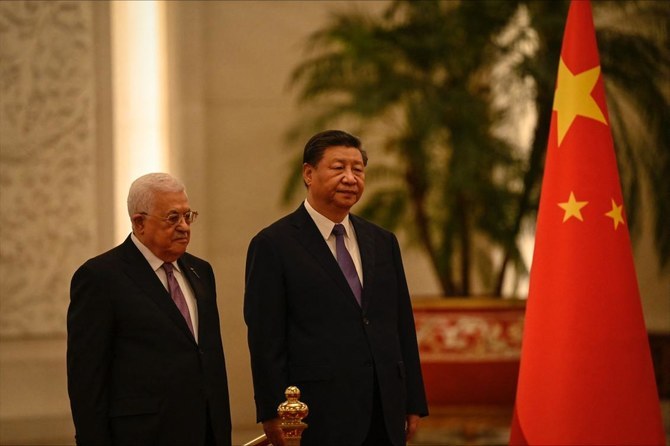
- ARAB NEWS
- 09 Jul 2025

It is important to examine China’s policy toward the Middle East, which has been shown to be successful and productive for several key reasons.
First of all, China’s Middle East policy is multidimensional, with its first facet composed of putting a significant emphasis on diplomacy. This policy is strengthening Beijing’s soft power in the region and increasing its engagement and footprints in the Middle East, specifically in the Gulf region, and first and foremost toward Saudi Arabia and the UAE.
A core pillar of China’s diplomatic role in the Middle East is maintaining and promoting peace and stability by preventing conflicts and tensions from spiraling out of control and leading to full-fledged war.
China is also attempting to project itself as a global peacemaker, which will definitely enhance its legitimacy, prestige and status on the international level. Foreign Minister Qin Gang in April declared that China is prepared to broker peace talks between Israel and Palestine with the aim of finding a resolution to their long-standing conflict. “China is willing to strengthen coordination and cooperation with Palestine to promote an early, comprehensive, just and lasting solution to the Palestine issue,” Chinese President Xi Jinping told Palestinian leader Mahmoud Abbas during the latter’s visit to China in June.
Beijing has also become one of the first countries to be engaged in the reconstruction of Syria.
It hopes to bring peace and stability to the Arab state after a memorandum of understanding was signed last year between the Chinese ambassador and the head of the Syrian National Council. Syria is another Middle Eastern nation that recently joined China’s Belt and Road Initiative.
China’s emphasis on soft power, rather than employing coercion and hard power, is part of its broader Belt and Road Initiative, which is a global investment strategy that is improving the infrastructure of more than 150 countries. This critical project was incorporated into the Constitution of the Chinese Communist Party in 2017.
The Belt and Road Initiative has two parts: the Silk Road Economic Belt and the 21st Century Maritime Silk Road. The key objective of the initiative is to construct “a unified large market and make full use of both international and domestic markets, through cultural exchange and integration, to enhance mutual understanding and trust of member nations, ending up in an innovative pattern with capital inflows, talent pool, and technology database.”
Any conflict between countries in the Middle East has the potential to ignite a regional conflagration, which will not serve the interests of China or the nations of the region.
China is attempting to project itself as a global peacemaker, which will definitely enhance its legitimacy.
Dr. Majid Rafizadeh
Another prominent recent example of Beijing employing diplomacy is the historic deal it brokered between Saudi Arabia and Iran, which was announced in March and was seen by some experts, scholars and policy analysts as a sign of China’s increasing influence in the Middle East. The agreement was a key development not only in terms of restoring ties between two Middle Eastern powers — Saudi Arabia and Iran — but also in reducing tensions and enhancing peace and security in the region. Improved ties between Riyadh and Tehran could have a significant impact on the region’s geopolitical and economic landscapes as well.
The second pillar of China’s policy toward the Middle East is anchored in not only the traditional oil and gas trade, but also in long-term investments in other areas, including in some Middle Eastern nations’ infrastructure, clean energy and information technology.
For instance, Beijing has committed itself to a significant investment in Iran via various fields.
In 2021, China and the Iranian government signed a 25-year strategic partnership deal, which is now in the early stages of implementation. According to the Tehran Times: “The Chinese foreign minister approved of his Iranian counterpart’s views expounded in his op-ed published in China’s Global Times. Wang (Yi) said the Iranian foreign minister’s views show the promising horizon in relations between Tehran and Beijing. The top Chinese diplomat underlined his country’s readiness to expand cooperation with Iran in financing, energy, banking and cultural sectors.”
Positive partnerships between China and Middle Eastern nations can also be found in other areas, including addressing climate change, renewable energy and the solar industry. For example, during a state visit by Xi to Riyadh last December, Saudi Arabia and China signed a memorandum of understanding on hydrogen energy.
Beyond gaining enhanced global legitimacy and status, it is worth noting that Beijing has a vested financial interest in stressing diplomacy and promoting peace and stability in the Middle East. China has strong trade and economic relationships with Saudi Arabia and other regional countries beyond its oil imports. According to Deutsche Welle, China “has cultivated strong economic and political ties with both Riyadh and Tehran in recent years. Saudi Arabia is China’s largest oil supplier, with trade between the two countries amounting to $87 billion in 2021. Commerce between Iran and China, meanwhile, was worth more than $16 billion in the same year, with Tehran depending on the Asian giant for as much as 30 percent of its foreign trade.”
In a nutshell, China’s engagement with the Middle East has been efficient, well-informed and successful due to the fact that it uses a multidimensional policy focusing on employing soft power, playing the key role of peacemaker and mediator, and carrying out long-term investments not only in the oil and gas sectors, but also in clean energy, renewable energy, infrastructure and technology.
• Dr. Majid Rafizadeh is a Harvard-educated Iranian-American political scientist.
Twitter: @Dr_Rafizadeh